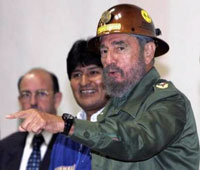Bolivia’s new president visits Cuba
By
Teresa Gutierrez
Published Jan 8, 2006 4:46 PM
The New Year began with a development of the
greatest importance for Latin America and for the class struggle: a visit by Evo
Morales to revolutionary Cuba. It was the first trip abroad by the newly elected
president of Bolivia. He went on New Year’s Eve, just as Cubans were
preparing to celebrate the anniversary of their socialist
revolution.
|
Evo Morales, center, in Cuba
with Fidel Castro.
|
Morales is the first Indigenous person to win the presidency
in Bolivia, even though the majority of the people are Indigenous. He was
elected on Dec. 18 with the largest vote for any president in
decades.
Morales is also expected to visit South Africa, China and Brazil.
He is not planning to visit the United States.
Evo, as he is
affectionately called by his supporters, will be inaugurated on Jan.
22.
Cuban President Fidel Castro said the election of Morales had
“shaken the world.”
The Cuban government placed a lot of
importance on Morales’s trip. A high-level delegation of Cubans took part
in the meetings with the Bolivian president-elect. They included the president
of Cuba’s National Assembly, Ricardo Alarcon; Carlos Lage, vice president
of the Council of State; and Foreign Minister Felipe Pérez Roque.
On the Bolivian side were 60 representatives, the largest delegation to
accompany Morales abroad. They included a miner, who presented a miner’s
hat to President Castro. He immediately put it on his head, according to the
Cuban daily Granma.
The miners of Bolivia have played a historic role in
that country, leading some of the most important and fiercest struggles against
oppression and exploitation. It was the struggle of the miners—who suffer
intense hardship—that led to the Bolivian Revolution of 1952. Because of
that revolution, the Indigenous people for the very first time won the right to
vote in their own country.
Cooperation in health,
education
and sports
Presidents Castro and Morales immediately signed bilateral
cooperation and solidarity agreements during the visit. The agreements, signed
on Dec. 30, mainly cover health care, education and sports.
As a result of
these agreements, Boli vians will now be receiving free eye care, with Cuba
contributing equipment and specialists. Cuba is also offering 5,000 scholarships
for Bolivians to become future doctors and specialists.
Cuba will assist
in a national literacy campaign in Bolivia as well.
A perusal of pictures
on the Internet shows many history-making photos of this important visit. They
are historic because of the significance of the struggle now raging in Latin
America.
The election of the first Indigenous person in Bolivia, and most
important an Indigenous leader who is a socialist and an anti-imperialist on the
side of the oppressed, has worldwide significance.
Evo Morales’s
orientation to Cuba shows that the popular movements in Latin America are
gaining strength and are veering away from Washington. They are anti-imperialist
and for self-determination.
Like Hugo Chávez in Venezuela, Cuba
now has a good friend in Evo Morales of Bolivia—a friend whose priority is
the people’s needs, not imperialist greed.
For this, Bolivia and
Venezuela, like Cuba, have earned the wrath of imperialism.
As Castro
asked, “Will the U.S. government be offended if Cuba helps increase the
life expectancy of Bolivians?”
This trip showed the unbreakable
links between the peoples of Latin America and Cuba. Bolivia is the land where
revolutionary leader Che Guevara, who was born in Argentina but fought in the
Cuban Revolution, was killed by the CIA.
Morales stated in Cuba that his
visit signified “one of two generations of struggle for dignity, a meeting
of two revolutions. The struggle of the Cuban people and above all of Ernesto
‘Che’ Guevara was not in vain. They left the seeds and now there are
fruits, not just in Bolivia but throughout Latin America.”
It surely
was a nightmarish New Year for the imperialists in Washington, D.C.
Articles copyright 1995-2012 Workers World.
Verbatim copying and distribution of this entire article is permitted in any medium without royalty provided this notice is preserved.
Workers World, 55 W. 17 St., NY, NY 10011
Email:
[email protected]
Subscribe
[email protected]
Support independent news
DONATE


